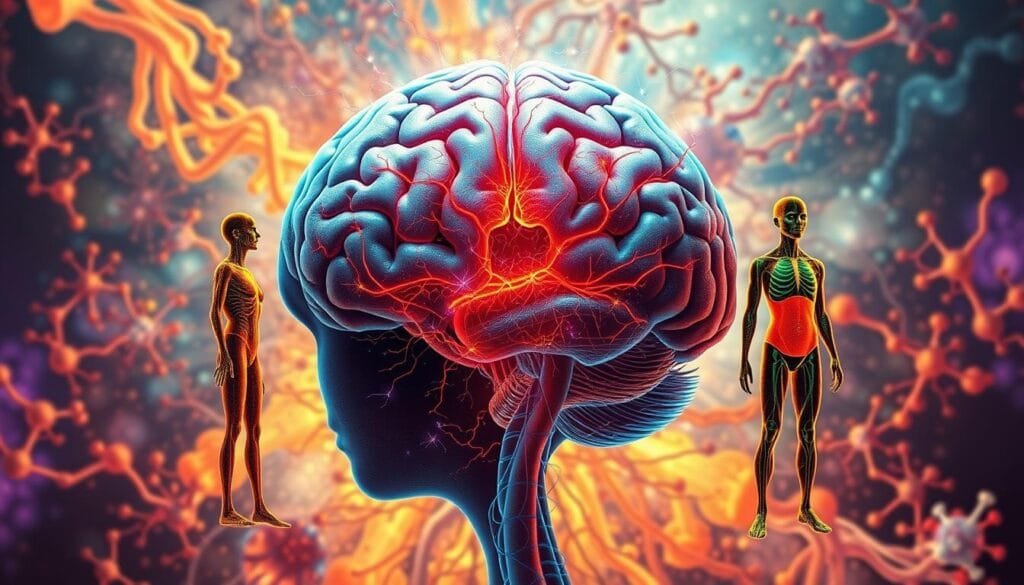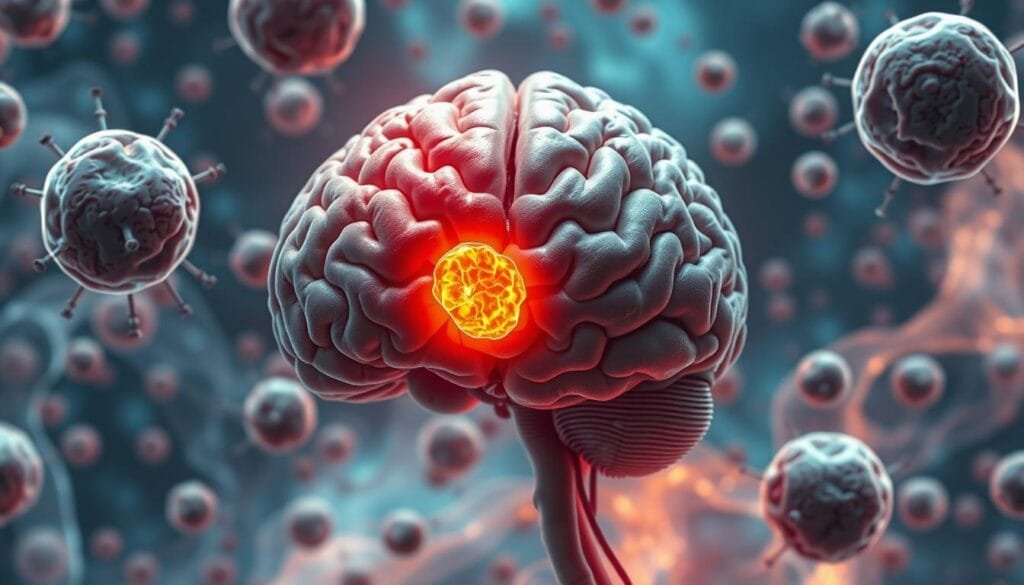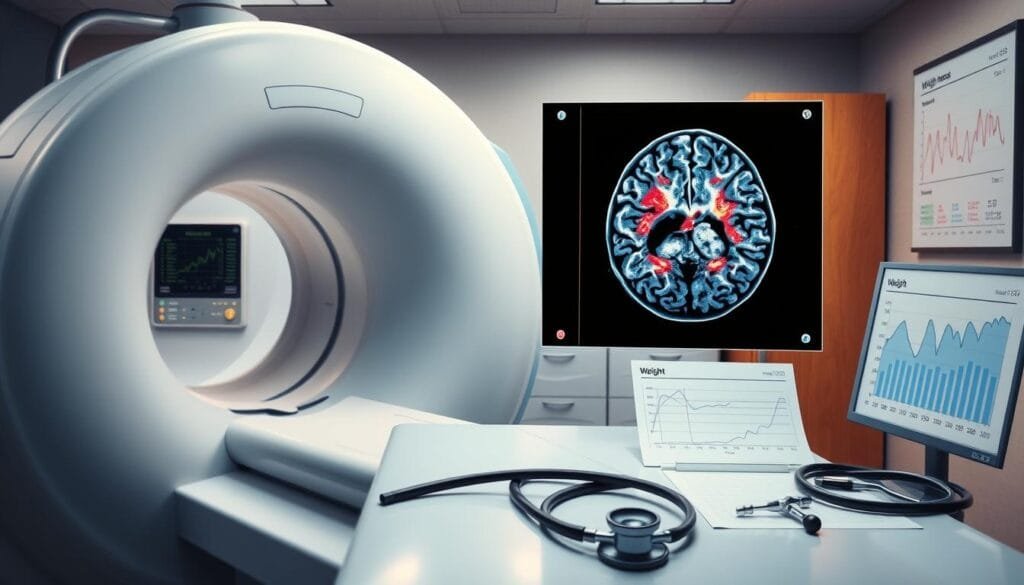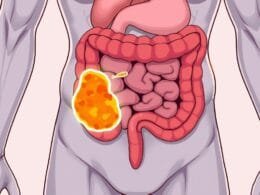Imagine carrying an invisible weight that changes everything. For kids with brain tumors like craniopharyngioma, life turns from joy to confusion and despair. These tumors not only bring physical challenges but also unexpected body changes.
A 2004 study in the Journal of Clinical Endocrinology and Metabolism found a link between these tumors and weight changes. This is even more true for hypothalamic obesity. Here, the brain’s appetite control centers are damaged.
Knowing how brain tumors, like those in the hypothalamus, cause obesity is key. It helps both patients and doctors. Early diagnosis and treatment can greatly improve the lives of kids with these challenges.
Key Takeaways
- Understanding the link between brain tumors and obesity is crucial for effective management.
- The hypothalamus plays a significant role in regulating appetite and body weight.
- Children treated for brain tumors are at risk for developing hypothalamic obesity.
- Timely diagnosis can help mitigate health problems linked to obesity from brain tumors.
- Comprehensive care and early intervention are key to managing hypothalamic obesity.
Understanding Hypothalamic Obesity
Hypothalamic obesity is a big challenge. It happens when the hypothalamus, a key part of the brain, doesn’t work right. This area controls hunger and energy balance. Damage here can lead to gaining too much weight and not being able to control hunger.
It’s important to understand how obesity and brain tumor correlation work. This helps us find and treat this condition better.
Overview of Hypothalamic Function and Obesity
The hypothalamus is like a control center for our body. It helps keep our energy levels balanced. Damage can come from:
- Brain surgery, like removing tumors
- Head trauma changing how it works
- Genetic problems affecting it
- Infections or swelling in the brain
People with hypothalamic obesity gain weight fast and a lot. They might feel:
- Always hungry or eat too much
- Use less energy
- Want to move less
- Feel very tired during the day
To diagnose this, doctors might check hormone levels, energy use, sleep, and use brain scans. Knowing these signs is key for doctors to help patients with brain tumors.
| Symptoms | Description |
|---|---|
| Rapid Weight Gain | Significant and quick increase in body weight. |
| Hyperphagia | Excessive appetite, leading to increased food intake. |
| Low Metabolic Rate | Reduced energy expenditure, even at rest. |
| Diminished Physical Activity | Decreased enthusiasm or ability to engage in physical exercise. |
| Excessive Daytime Sleepiness | Overwhelming fatigue affecting daily activities. |
Fixing hypothalamic obesity needs a full plan. This might include hormone shots, diet advice, and a team of doctors. Starting treatment early is key to better results for those affected.
What Is the Hypothalamus and Its Role?
The hypothalamus is a small but vital part of the brain. It acts as a central hub for many body functions. It regulates hunger, thirst, and body temperature.
Understanding the hypothalamus role is key to brain function regulation. It helps communicate between different body parts and the brain.
The hypothalamus plays a big role in appetite control. It takes signals from the gut, fat tissues, and hormones to decide when we’re hungry or full. When it works right, it helps us keep a healthy weight.
But, if it doesn’t work right, we might eat too much and gain weight. This can happen because of damage to the hypothalamus.
Studies show that problems with the hypothalamus can change how we eat and our hormone levels. For example, kids with injuries to the hypothalamus might get really overweight and have other health problems.
The hypothalamus is important for managing these issues. Knowing how it works helps us understand and treat problems like hypothalamic obesity.
| Function | Description |
|---|---|
| Hunger Regulation | Integrates signals indicating the body’s energy needs, prompting eating behaviors. |
| Hormone Secretion | Releases hormones that control bodily functions like growth, metabolism, and stress response. |
| Thermoregulation | Maintains body temperature by initiating heat loss or production mechanisms. |
| Fluid Balance | Regulates thirst by responding to osmotic pressure in the blood. |
| Sleep-Wake Cycles | Influences circadian rhythms and sleep patterns. |
A Brain Tumor That Results in Obesity Would Most Likely Be Located in the Hypothalamus
The hypothalamus is key in controlling our body’s functions, like hunger and metabolism. A brain tumor in this area can lead to severe obesity. Studies show that tumors like craniopharyngiomas often disrupt the hypothalamus, causing obesity.
It’s vital to understand how these tumors affect our bodies. Kids treated for tumors in the hypothalamus, like through surgery, are at high risk of obesity. This condition makes them hungry all the time and can cause them to gain weight quickly, changing their life a lot.
People with hypothalamic obesity often have slower metabolisms and eat too much. To manage these symptoms, doctors and dietitians work together. They focus on healthy eating, exercise, and mental support.
Obesity is a big problem worldwide, affecting millions. Knowing how brain tumors and obesity are linked is key to better care. This knowledge helps in finding the right treatments and support for those affected.
Types of Brain Tumors Linked to Obesity
It’s important to know about brain tumors that can cause obesity. Tumors like craniopharyngiomas, gliomas, and germinomas can affect weight. Craniopharyngiomas are common in kids, making up 80% of tumors in the brain area they’re in.
Craniopharyngiomas are linked to obesity. About 65% of kids treated for these tumors become overweight or obese 7.6 years later. How much the tumor affects the hypothalamus can also impact weight gain.
Weight gain from these tumors often comes from hormonal imbalances. Damage to the hypothalamus messes with hormones like leptin and insulin. This can lead to higher insulin levels and insulin resistance, making obesity more likely.
Meningiomas and gliomas also increase the risk of obesity. Studies show a strong link between obesity and many cancers. Knowing how these tumors affect weight helps doctors find better treatments.
Symptoms of Obesity Related to Brain Tumors
People with brain tumors often face serious issues like constant hunger and weight gain. They also deal with hormonal problems, like insulin resistance. These signs show how brain tumors can affect health.
Many people also experience mood swings and trouble controlling their eating. These mental and physical problems can really hurt their quality of life.
| Symptom | Details |
|---|---|
| Persistent Hunger | Individuals may experience an unyielding desire to eat, often beyond normal physiological needs. |
| Excessive Weight Gain | Rapid weight gain can occur due to hormonal disruptions caused by the tumor. |
| Insulin Resistance | Hormonal imbalances may lead to insulin resistance, further complicating weight management. |
| Mood Changes | Emotional fluctuations can be prevalent, affecting mental health and appetite control. |
| Behavioral Issues | Struggles with managing eating habits may result in disordered eating patterns. |
| Physical Discomfort | Headaches and fatigue are common complaints among individuals with brain tumors. |
The severity of these symptoms can change based on the tumor’s type and size. Knowing about these symptoms is key for getting the right treatment. Treating both the body and mind can greatly improve life for those affected.
How Hypothalamic Injury Causes Obesity
Hypothalamic injury obesity comes from damage to the hypothalamus. This area is key for controlling hunger and energy balance. Damage can be caused by brain tumors, injuries, infections, or radiation.
When the hypothalamus is damaged, it can’t send the right signals about metabolism. This leads to feeling hungrier and less full. As a result, people might eat more than they need, even if they’re not hungry.
Studies show that people with hypothalamic injuries often gain weight. A review found that 40-45% of those with tumors like craniopharyngiomas get obese. They might eat more high-calorie foods because they’re always hungry.
Brain injuries can change how people eat. They might eat impulsively or choose unhealthy foods. Hormones like insulin and leptin can also play a role, making it harder to lose weight.
In summary, hypothalamic injury and obesity are linked by complex brain and hormonal issues. Understanding these connections is key to managing obesity related to hypothalamic problems.
| Research Study | Findings |
|---|---|
| van Iersel et al. | Rated hypothalamic obesity occurrence at 40-45% following craniopharyngioma and similar tumors. |
| Müller HL et al. | 15-20% prevalence of eating disorders in long-term survivors of childhood-onset craniopharyngioma. |
| Jasinska et al. | Impulsivity contributes to unhealthy eating behaviors with a prevalence of 25-30%. |
| Müller et al. | Identified a 50-55% likelihood of obesity in childhood craniopharyngioma patients post-surgery. |
| Seo et al. | Developed the FATIS system for assessing food-related behaviors. |
Treatment Options for Hypothalamic Obesity
Treatment for hypothalamic obesity includes many strategies. Each one is designed to meet the unique needs of those affected. These methods focus on finding the best way to help each person.
First, nutritional support and physical activity are key. They form the foundation of any good treatment plan. For some, medications can also help. They work to control hunger and help with weight loss.
Research shows that different medical treatments can be effective:
- A study found that a mix of fenfluramine and phentermine helped people lose 5.8 kg. This shows these drugs can help with weight loss.
- Another study showed sibutramine helped people lose an average of 3.6 kg. This is more than those who took a placebo.
- The CONQUER trial found that phentermine and topiramate together led to an 8.6% weight loss. This proves these treatments can be very effective.
For those who can’t lose weight with diet and drugs, surgery might be an option. Procedures like Roux-en-Y gastric bypass can reduce ghrelin levels. This helps with further weight loss and improves metabolic health.
Doctors often work together to create treatment plans. They include endocrinologists, nutritionists, psychologists, and surgeons. This team approach ensures all aspects of a patient’s health are considered.
| Study | Intervention | Weight Loss Achieved |
|---|---|---|
| Double-blind clinical trial (1984) | Fenfluramine + Phentermine | 5.8 kg |
| Journal of Clinical Endocrinology and Metabolism (2007) | Sibutramine | 3.6 kg |
| CONQUER Trial (2011) | Low-dose phentermine + Topiramate | 8.6% |
| Journal of Clinical Endocrinology and Metabolism (2005) | Roux-en-Y Gastric Bypass | Reduction in ghrelin levels |
The treatment for hypothalamic obesity is complex. It involves many advanced methods. All are aimed at managing this condition caused by brain tumors.
The Connection Between Tumors and Obesity
The link between tumors and obesity is complex. It involves many biological and physical pathways. Research shows a strong connection, with brain tumors affecting hormones and metabolism.
Studies show that obesity increases the risk of certain brain tumors. This includes gliomas and meningiomas. It’s clear that obesity is a risk factor.
Obesity can affect how well patients do with brain tumors. A study found that obesity is a big risk factor. It shows how important it is to understand this connection better.
Childhood brain tumor survivors often gain weight. About 33.1% become overweight or obese. This is much higher than the general population.
Diabetes insipidus and central precocious puberty also increase obesity risk. This shows how complex the tumor-obesity relationship is. Obesity can make health problems worse, affecting survivors’ quality of life.
Understanding the link between cancer and obesity is key. It helps doctors see how tumors and treatments change metabolism. This knowledge can lead to better treatments and outcomes for patients.
| Study Type | Findings |
|---|---|
| Meta-analysis | Obesity is a significant risk factor for brain/CNS tumors. |
| Systematic Review | Positive correlation between BMI and the risk of brain tumors. |
| Observational Study | 33.1% of childhood brain tumor survivors experience significant weight gain. |
| Cohort Study | Low-grade glioma associated with a higher likelihood of obesity. |
| Experimental Research | Diabetes insipidus linked to a significantly higher likelihood of obesity. |
Understanding Appetite Regulation in Hypothalamic Obesity
The hypothalamus is key in appetite regulation, managing hunger and fullness. Damage here can mess up eating habits. This damage makes it hard for the brain and gut to talk, leading to constant hunger.
Studies show kids with craniopharyngioma often see changes in weight and body mass index. More than half of them develop hypothalamic obesity after surgery. This affects hormones like insulin and leptin, which control energy.
Appetite isn’t just about body signals. Changes in glucose and insulin levels can cause metabolic syndrome. This makes it tough for patients to lose weight, even with diet and exercise.
It’s important to understand how hormones and the brain work together. Treatments like bariatric surgery and vagotomy might help. They aim to fix the communication between the brain and gut, helping with weight management in hypothalamic obesity.
The Importance of Timely Diagnosis
Getting a timely obesity diagnosis is key in managing obesity linked to brain tumors. Early detection of hypothalamic injury helps manage weight issues better. This greatly improves health outcomes. Studies show that kids with certain brain tumors are at high risk of becoming obese.
A study of 101 kids who had a specific brain tumor found eating and weight issues. Another study with 166 kids with another type of brain tumor found serious health problems. These findings highlight the need for quick diagnosis to avoid obesity risks.
Imaging and hormone tests are crucial for accurate symptom assessment. Brain tumor survivors often face hypothalamic-pituitary dysfunction. About 14.2% of kids with brain tumors are overweight at diagnosis, showing the need for close monitoring.
Looking at BMI can help predict obesity in these patients. The mean BMI SDS can forecast obesity trends. This makes early obesity diagnosis vital for effective management.
Adding psychological assessments to management plans is important. It’s key to understand how mental health and obesity affect childhood cancer survivors. Research into these factors can lead to better obesity management programs.
| Study Focus | Findings |
|---|---|
| Suprasellar Low-Grade Glioma | Significant transition to hypothalamic obesity observed |
| Childhood-Onset Craniopharyngioma | Eating behavior and weight problems in survivors |
| Pediatric Optic Gliomas | Notable neuroendocrine morbidity post-diagnosis |
| Hypothalamic-Pituitary Dysfunction | Prevalent in long-term childhood brain tumor survivors |
| Body Mass Index at Diagnosis | Average BMI SDS indicating weight status |
Coping with Mental and Emotional Health Challenges
Dealing with mental health issues linked to brain tumors and obesity can be tough. Many face anxiety, depression, and body image problems due to sudden weight gain. Studies show that being overweight or obese can lead to more depression in adults. This highlights the need for good coping strategies.
There’s a strong link between obesity and mental health problems. The hormone leptin, which helps control weight, is often out of balance in people with obesity and depression. It’s important to offer emotional support to help them heal and grow stronger.
- Getting involved in fitness and physical activities can boost mood and self-esteem.
- Joining support groups helps people connect with others who understand their struggles.
- Cognitive-behavioral therapies teach ways to handle negative thoughts and feelings about body image.
- Mindfulness and stress-reduction techniques can help reduce anxiety and improve emotional health.
Weight stigma makes mental health issues worse by causing shame and isolation. People with obesity often face online bullying, which is hard for teens. Creating a supportive environment at home and in the community can help overcome these challenges.
Given the complex relationship between obesity and mental health, it’s important to offer the right help. Tailoring coping strategies and focusing on emotional support is key to improving overall well-being.
| Mental Health Challenge | Associated Coping Strategy |
|---|---|
| Anxiety | Mindfulness practices like meditation |
| Depression | Cognitive-behavioral therapy |
| Body Image Issues | Support groups for emotional support obesity |
| Isolation | Community engagement activities |
Conclusion
Brain tumor obesity shows a complex link between the brain’s function and weight control. This article has highlighted the importance of understanding both the physical and mental effects of these conditions. It’s crucial to know that about 2% of brain tumors are related to obesity. Also, 40% of cancers in the U.S. are linked to being overweight or obese.
Effective health management is key. It must tackle these connections to help patients improve their health. This approach offers a comprehensive way to better outcomes.
Early detection of brain tumors, like those in the hypothalamus, is vital to prevent obesity-related issues. People who are overweight or obese are at higher risk for certain brain tumors. This shows the need for treatments that include psychological support.
This approach helps in better treatment planning. It also encourages a deeper understanding of managing health issues related to obesity.











